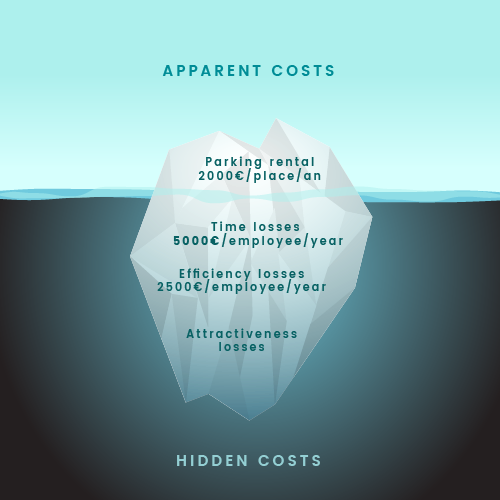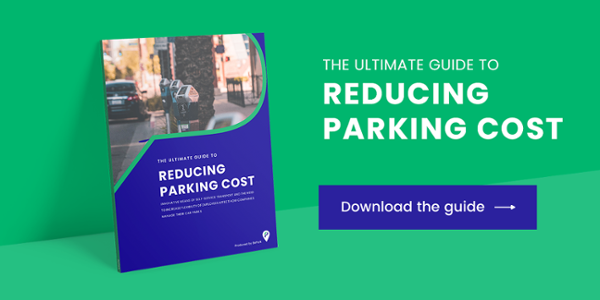Do you know the cost structure of your parking lots? Are you able to calculate it precisely? Do you know how much this cost structure is influenced by the quality of your parking management?
The purpose of this article is to help you better understand how parking costs appear and how to minimize their impact.
First of all, it is important to make a distinction of the different types of costs that can be induced by the use of parking lots by a company. For simplicity, we classify them into two distinct categories:
First of all, there are the "direct costs" of your parking lots. They are of course the easiest to understand and result directly from renting parking spaces. They represent the share of parking spaces in your offices rental OR the rent of parking spaces if you rent spots from an outside company.
The cost of this rent will depend on the location of your offices, the type of parking etc. In most cities in Europe, a parking space is rented between €100 and €250 per month. It therefore represents between €1200 and €3000 per place each year for the company.
To this must be added the various local taxes. This is of course already a large sum. Yet this is only the tip of the iceberg. Indeed, the indirect costs are the ones making your bills explode.
Indirect costs are much more complicated to understand and calculate. In many cases, their proportion to direct costs is highly dependent on the efficiency of parking management.
Mismanagement can drastically increase the cost because:
Unclear management of your company's parking lots leads to a lack of efficiency and potentially a significant loss of time for your employees.
Between a search for a parking spot for several minutes that sometimes ends vain, the need for the parked employee to regularly adjust his parking disk or the need to walk long distances between the vehicle and the workplace, it is reasonable to consider that an employee, on average, loses up to 30 minutes a day due to the need for parking.
Based on the Belgian average salary of €3401 gross, these 30 minutes per day make a total of 2:30 per week. On a week of 38 hours there is a loss of 6.6% of the time. We arrive at €225 loss per month and therefore more than €2500 for the year.
We can consider that this time could have been used by the employee to be productive for the business. It can be assumed that the total value lost by the employee being absent at these times at least equals the total of his salary for that time, which is at least €2500 per year.
That is already a total of €5000 lost per employee and per year.
In addition, your employee who has wasted time and gas to then walk to the office will not be in the best mindset to start working.
A good mood gives us energy. Energy is a staple of creativity and is trait that pulls teams together. It is understandable that employers would want their employees in a good frame of mind for work.
For this exercise, we will assume that a stressed or frustrated employee at the beginning of the day will see his average productivity decreased by approximately 30 minutes per day. Or €2500 for the year as mentioned beforehand in the article.
In an ultra-competitive market, you know that more needs to be done to attract new talent.
When you know that 78% of candidates favor a good working atmosphere even before knowing the salary, a company must avoid conflicts between employees or even tensions with superiors. One of the things that can cause a bad atmosphere in the company is a lack of employee access to the parking lot. It is necessary to have a fair and efficient system so that all employees understand and agree with the company's mobility policy.
Mobility within the company will therefore be an important factor when candidates consider their different options.
We know that replacing an employee can cost more than 100% of his annual salary taking into account the time to manage his departure, find someone to replace him, train him, etc ... The importance of providing a pleasant environment to your employees is no longer something that needs to be proven.

How to reduce these costs? This is a complicated question. It is not enough to simply provide more parking for your employees because the proportion of direct costs compared to indirect costs would see itself be rebalanced. The fact remains that the total sum of parking costs might remain unchanged .
The answer is in a fair balance between:
To go further, you should download our guide on "how to reduce costs through efficient parking management" . This guide summarizes our analysis and valuable tips for setting up your parking policy.

If you wish to discuss your case directly with one of our experts, do not hesitate to contact us via this link.